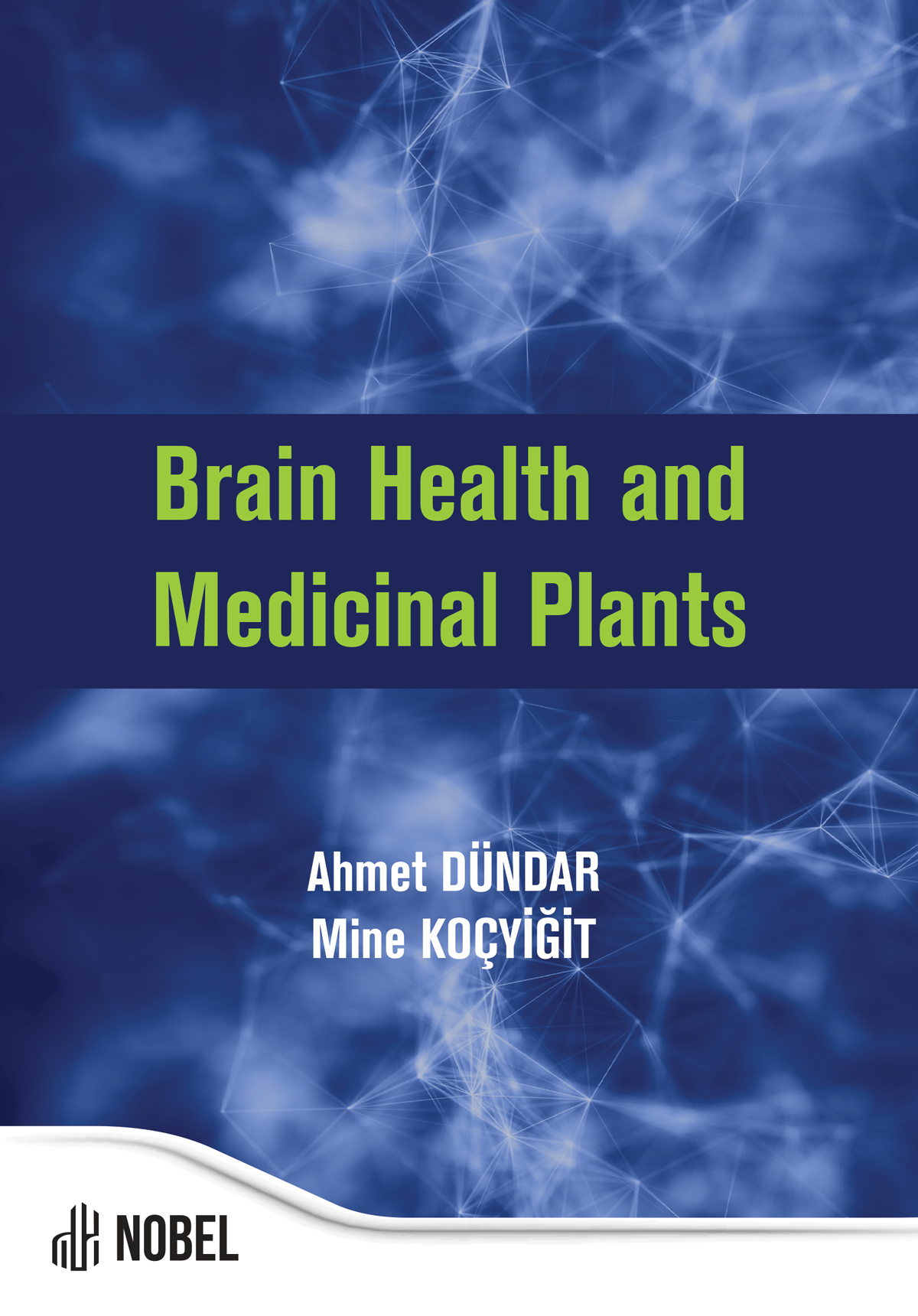Medicinal Plants, Gut Microbiota-Brain Relationship in Brain Disorders
Bulent Olcay (Author), Fatima Nur Yilmaz (Author)
Release Date: 2024-05-31
Medicinal plants have been an important therapeutic option for the treatment of gastrointestinal disorders since ancient times. Among the wide range of diseases affecting the gastrointestinal tract, the main areas of application for medicinal plants are functional and chronic gastrointestinal disorders, such as functional dyspepsia and irritable bowel syndrome. Gut microbiota affects human behavior. This [...]
Media Type
Buy from
Price may vary by retailers
| Work Type | Book Chapter |
|---|---|
| Published in | Brain Health and Medicinal Plants |
| First Page | 35 |
| Last Page | 53 |
| DOI | https://doi.org/10.69860/nobel.9786053359241.3 |
| Page Count | 19 |
| Copyright Holder | Nobel Tıp Kitabevleri |
| License | https://nobelpub.com/publish-with-us/copyright-and-licensing |
Bulent Olcay (Author)
Res. Assist, Istanbul Universty
https://orcid.org/0000-0002-0521-488X
3Bülent Olcay completed his doctorate in 2023 at Istanbul University, Faculty of Pharmacy, Department of Pharmaceutical Botany. In 2019, he was appointed as a research assistant in this department. His areas of expertise are medicinal plants, plant taxonomy, Molecular Phylogeny
Fatima Nur Yilmaz (Author)
Research Assistant, Istanbul Aydın University
https://orcid.org/0000-0001-8442-8538
3Fatma Nur Yılmaz completed her doctorate in 2023 at Istanbul University, Faculty of Pharmacy, Department of Pharmaceutical Microbiology. In 2019, She was appointed as a research assistant in this department. Her areas of expertise are antibacterials antimicrobials, MRSA, MIC, antibacterial Activity, Antibiotic Resistance, Antiimicrobial Susceptibility Testing, Bacteriology,Microbial Virology.
Kelber O, Bauer R., Kubelka W. Phytotherapy in functional gastrointestinal disorders. Dig. Dis.2018; 35: 36–42.
Schilcher H, Kammerer S, Wegener T. Leitfaden Phytotherapie, 3. Auflage. Leitfaden Phytotherapie. 2016; Elsevier GmbH, München.
Wagner H, Wiesenauer M. Phytotherapie, 2. Auflage. 2003; Wissenschaftliche Verlagsgesellschaft mbH, Stuttgart.
Kelber O, Bauer R, Kubelka W. Phytotherapy in functional gastrointestinal disorders. Dig. Dis. 2018; 35: 36–42.
Neuman H, Debelius JW, Knight R, Koren O. Microbial endocrinology: the interplay between the microbiota and the endocrine system. FEMS Microbiol Rev. 2015;39: 509-521.
Dahlin M, Elfving A, Ungerstedt U, Amark P. The ketogenic diet influences the levels of excitatory and inhibitory amino acids in the CSF in children with refractory epilepsy. Epilepsy Res. 2005; 64: 115-125.
De Theije CG, Wopereis H, Ramadan M, Van Eijndthoven T, Lambert J, Knol J, Garssen J, Kraneveld AD, Oozeer R. Altered gut microbiota and activity in a murine model of autism spectrum disorders. Brain Behav Immun. 2014; 37: 197-206.
Li Q and Zhou JM. The microbiota-gut-brain axis and its potential therapeutic role in autism spectrum disorder. Neurosci. 2016; 324: 131-139.
Macfabe D. Short-chain fatty acid fermentation products of the gut microbiome: Implications in autism spectrum disorders. Microb Ecol Health Dis. 2012; 23: 1-24.
Bolte ER. Autism and Clostridium tetani. Med Hypotheses. 1998; 51: 133-144.
Felice VD, Quigley EM, Sullivan AM, O'keeffe GW, O'mahony SM. Microbiota-gut-brain signalling in Parkinson's disease: Implications for non-motor symptoms. Parkinsonism Relat Disord. 2012; 27: 1-8.
Park H, Lee JY, Shin CM, Kim JM, Kim TJ, Kim JW. Characterization of gastrointestinal disorders in patients with parkinsonian syndromes. Parkinsonism Relat Disord. 2015; 21: 455- 460.
Pierantozzi M, Pietroiusti A, Sancesario G, Lunardi G, Fedele E, Giacomini P, Frasca S, Galante A, Marciani MG, Stanzione P. Reduced L-dopa absorption and increased clinical fluctuations in Helicobacter pylori-infected Parkinson's disease patients. Neurol Sci. 2001; 22: 89- 91.
Dinan TG, Cryan JF. The impact of gut microbiota on brain and behaviour: implications for psychiatry. Curr Opin Clin Nutr Metab Care. 2015; 18: 552-558.
Kalaria RN. Vascular basis for brain degeneration: faltering controls and risk factors for dementia. Nutr Rev. 2010; 68: 74-87.
Bruce-Keller AJ, Salbaum JM, Luo M, Blanchard Et, Taylor CM, Welsh DA and Berthoud HR. Obese-type gut microbiota induce neurobehavioral changes in the absence of obesity. Biol Psychiatry. 2015; 77:607–615.
Dey P. Gut microbiota in phytopharmacology: A comprehensive overview of concepts, reciprocal interactions, biotransformations and mode of actions. Pharmacol. Res. 2019; 147: 104367.
Chen F, Wen Q, Jiang J, Li HL, Tan YF, Li YH, Zeng NK. Could the gut microbiota reconcile the oral bioavailability conundrum of traditional herbs. J. Ethnopharmacol. 2016; 179: 253–264.
Adeyemi OO, Akindele AJ, Yemitan OK, Aigbe FR, Fagbo FI. Anticonvulsant, anxiolytic and sedative activities of the aqueous root extract of Securidaca longepedunculata Fresen. J. Ethnopharmacol. 2010; 130: 191–195.
Dhama K, Tiwari R, Chakrabort S, Saminathan M, Kumar A, Karthik K, Wani MY, Amarpal Singh SV, Rahal A. Evidence Based Antibacterial Potentials of Medicinal Plants and Herbs Countering Bacterial Pathogens Especially in the Era of Emerging Drug Resistance: An Integrated Update. Int. J. Pharmacol. 2013; 10: 1–43.
Rosenblat JD, McIntyre RS. Efficacy and tolerability of minocycline for depression: A systematic review and meta-analysis of clinical trials. J. Affect. Disord. 2018; 227: 219–225.
Hao W, Gan H, Wang L, Huang J, and Chen J. Polyphenols in edible herbal medicine: targeting gut-brain interactions in depression-associated neuroinflammation. Critical Reviews in Food Science and Nutrition. 2023; 63(33): 12207-12223.
HMPC (2024). The Committee on Herbal Medicinal Products. (https://www.ema.europa.eu/en/medicines/download-medicine-data, accessed 29.03.2024)
Korczak M, Pilecki M, Granica S, Gorczynska A, Pawłowska KA and Piwowarski JP. Phytotherapy of mood disorders in the light of microbiota-gut-brain axis. Phytomedicine. 2023; 111: 154642.
| onix_3.0::thoth | Thoth ONIX 3.0 |
|---|---|
| onix_3.0::project_muse | Project MUSE ONIX 3.0 |
| onix_3.0::oapen | OAPEN ONIX 3.0 |
| onix_3.0::jstor | JSTOR ONIX 3.0 |
| onix_3.0::google_books | Google Books ONIX 3.0 |
| onix_3.0::overdrive | OverDrive ONIX 3.0 |
| onix_2.1::ebsco_host | EBSCO Host ONIX 2.1 |
| csv::thoth | Thoth CSV |
| json::thoth | Thoth JSON |
| kbart::oclc | OCLC KBART |
| bibtex::thoth | Thoth BibTeX |
| doideposit::crossref | CrossRef DOI deposit |
| onix_2.1::proquest_ebrary | ProQuest Ebrary ONIX 2.1 |
| marc21record::thoth | Thoth MARC 21 Record |
| marc21markup::thoth | Thoth MARC 21 Markup |
| marc21xml::thoth | Thoth MARC 21 XML |

